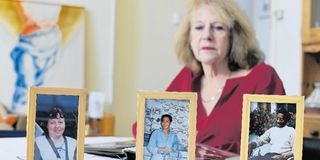Two Rwanda genocide survivors testify in the first Brussels trial

Martine Beckers who lost her sister, brother-in-law, and niece during the Rwandan genocide poses next to the pictures of the deceased as she answers the journalist during interview in Limelette, on November 5, 2019. The trial of Fabien Neretse, accused of war crimes during the Rwanda Genocide in 1994, opened at the Assizes Court of Brussels Capital on November 4, 2019. PHOTO | AFP
What you need to know:
It was April 9, 1994, three days after assassination of Rwanda’s Hutu president Juvenal Habyarimana that was the trigger for the genocide, “We begged them to let us live,” Nkaka, survivor, said
Brussels. Lying still under the bodies of executed relatives, the siblings played dead to stay alive.
Regine Bategure, today aged 41, and her brother Emmanuel Nkaka, 37, vividly remember the time they got caught up in the violence that erupted in Rwanda in mid-1994, resulting in a genocide that ended up killing 800,000 people.
They survived. And on Friday they testified in a trial in Belgium of a man accused of giving the order behind a blood-soaked day 25 years ago when a Hutu militia came to murder them.
Fabien Neretse, a 71-year-old former Rwandan official, has been in the Brussels court since last week accused of sending out ethnic Hutu militants to help kill the Tutsi residents of his Kigali district in April 1994. He denies the allegations. His trial is expected to wrap up mid-December. Bategure and Nkaka told the court they saw a relative of Nerestse’s among the armed Hutu militiamen and soldiers who got out of a van to stop their vehicle.
It was April 9, 1994, three days after assassination of Rwanda’s Hutu president Juvenal Habyarimana that was the trigger for the genocide.
They had been about to drive to the UN mission in Kigali to seek refuge.
The previous night, the Interahamwe, the Hutu militia, had ransacked the house where they lived, belonging to their Tutsi uncle Isaie, his Belgian wife Claire and their cousin Katia. The militia said that when they returned “we will kill you,” Bategure said. The militia ended up coming back just as they were about to drive off in Isaie’s packed car. Bategure was 16 at the time. Nkaka was 11.
The militiamen and soldiers forced them out and threw their possessions to the ground. “They started swearing at us and hitting us with metal rods,” Bategure said.
Then they took them and half a dozen other captives to the back of a nearby house, ordering them into two rows. Bategure was in the second line, behind Isaie, Claire and Katia.
“We begged them to let us live,” Nkaka said. But a soldier responded “No, we won’t spare you” and shot Claire, he said. “No mercy for cockroaches,” the soldier said, he added.
Bategure said she was lying on the ground. “And they started to shoot everyone.” The militiamen then examined their victims, finishing off any they thought were still alive. In all, 10 people were murdered.
Then the armed men left, and silence filled the scene. One shape rose from the tumble of corpses: Bategure, who then started running.
A little boy followed her. Nkaka, her brother, had also survived.
“My cousin Katia had fallen on top of me,” he explained to the court. “As there was a lot of blood, I think they believed I was dead.” The two panicked children knocked in vain on the door of e nearby home, then spent the night in an outdoor toilet on the property. The next day, Bategure said, she saw Nerestse at her home with militiamen, looking for them. (AFP)




